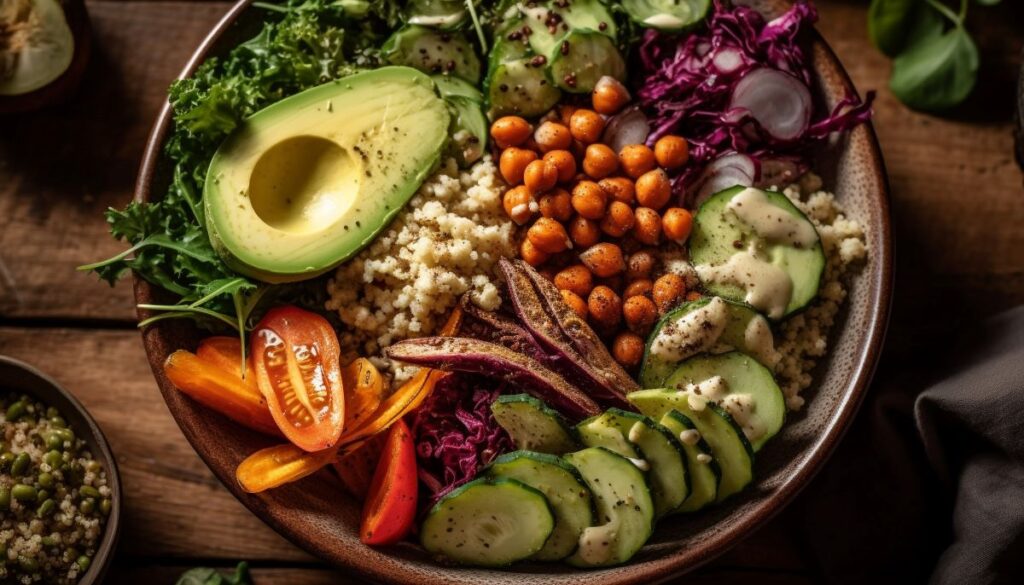Eating Patterns Beneficial for Your Gut Microbiome: Insights and Recommendations

By Rebecca Jaspan MPH, RD, CDN, CDCES
The gut microbiome is an important factor in human health and more and more research is showing its role in the prevention of chronic diseases. Dietary habits are linked to changes in the gut microbiome that are thought to contribute to diseases such as diabetes, irritable bowel syndrome, atherosclerosis, and asthma. Additionally, the gut microbiome plays a crucial role in helping control digestion and promoting a healthy immune system.1 Researchers are increasingly interested in studying the variation of dietary patterns in the general population to identify which components are best associated with a healthy gut microbiome and positive health outcomes.2
So, what makes a healthy gut microbiome? The gut microbiome is made up of bacteria, viruses, and fungi that live throughout the digestive tract and on your skin. There are about 1,000 different species bacteria in the human gut microbiome and each plays a different role in your body.3 Research shows that a diverse microbiome is associated with lower chronic disease rates and a loss of microbiota diversity is the most consistent finding of intestinal dysbiosis, or unbalanced microbiota.4 This suggests that reintroducing bacterial diversity into the digestive system is imperative for improving or restoring gut microbiome diversity. Decreased microbial diversity also predicts the response to treatments of certain conditions. For example, in a study looking at children with ulcerative colitis, those with a more diverse microbiota responded better to corticosteroids.5
A question both researchers and clients ask often is what type of eating pattern is shown to have the greatest impact on the health of the gut microbiome. In a study published in February 2022, the researchers explored the contribution of the long-term diet by looking for dietary patterns that are best associated with a healthy gut microbiome in a population-based cohort. Previous studies looking at diet quality and the gut microbiome use priori approaches, or knowledge based on hypotheses instead of actual experience. This study is unique because it used both priori and posteriori approaches, which looked at results from hypotheses and lived experience from the participants.6
The study recruited 1800 participants and gathered human microbiome data long with demographics, lifestyle, and dietary data. The participants informal dietary questions and also completed a Food Frequency Questionnaire. The researchers looked for associations between dietary patterns and 16S rRNA gene-based gut microbiome profiles.6
After looking at 61 dietary patterns, the researchers found that larger amounts of plant foods and fewer amounts of animal foods were associated with a better overall diet quality. Additionally, they found that the Flexitarian eating pattern, which consists of high amounts of fruits, whole grains, nuts, in addition to meat and high amounts of dairy products, had higher gut microbiota diversity. The study did not find any significant data to support individual foods or nutrients contribute to greater gut microbiota diversity.6
Overall, this study concluded that a global approach to eating patterns explains gut microbiota variations rather than single nutrient data. It also observed that a higher intake of plant protein compared to animal protein was positively associated with Bifidobacterium, or good bacteria, in our gut. However, the study does not show any evidence for eliminating any food from the diet to achieve a diverse and healthy gut microbiome.6
The study did contain several limitations. First, the dietary intake of the participants was self-reported and measured by FFQ, which may have inherent measurement error and bias. Additionally, a causal relationship between diet and gut microbiota cannot be determined with the cross-sectional design of the study. Also, due to country-specific guidelines, the study results are not generalizable across countries and populations.6
Despite the study’s limitations, it gives good insight into the different types of eating patterns that may contribute to a healthy and diverse gut microbiome. While there are benefits to eating more plant-based foods, research does not support eliminating meat and dairy. In fact, fermented dairy foods such as yogurt and kefir are shown to have benefits for the gut microbiome. The best eating pattern for gut health is one that contains a wide variety of all foods, in addition to lifestyle factors such as good sleep, movement, and stress management. Need help finding an eating pattern good for your gut? The dietitians at LCWNS can assist you in creating the most diverse eating pattern possible to support your gut health.
Resources:
- Zinöcker MK, Lindseth IA. The Western Diet-Microbiome-Host Interaction and Its Role in Metabolic Disease. Nutrients. 2018;10(3):365. Published 2018 Mar 17. doi:10.3390/nu10030365
- Cotillard A, Cartier-Meheust A, Litwin NS, Chaumont S, Saccareau M, Lejzerowicz F, Tap J, Koutnikova H, Lopez DG, McDonald D, Song SJ, Knight R, Derrien M, Veiga P. A posteriori dietary patterns better explain variations of the gut microbiome than individual markers in the American Gut Project. Am J Clin Nutr. 2022 Feb 9;115(2):432-443. doi: 10.1093/ajcn/nqab332. PMID: 34617562; PMCID: PMC8827078.
- Integrative HMP (iHMP) Research Network Consortium. The Integrative Human Microbiome Project: dynamic analysis of microbiome-host omics profiles during periods of human health and disease. Cell Host Microbe. 2014;16(3):276-289. doi:10.1016/j.chom.2014.08.014
- Jalanka-Tuovinen J, Salonen A, Nikkilä J, et al. Intestinal microbiota in healthy adults: temporal analysis reveals individual and common core and relation to intestinal symptoms. PLoS One. 2011;6(7):e23035. doi:10.1371/journal.pone.0023035
- Michail S, Durbin M, Turner D, et al. Alterations in the gut microbiome of children with severe ulcerative colitis. Inflamm Bowel Dis. 2012;18(10):1799-1808. doi:10.1002/ibd.22860
- Cotillard A, Cartier-Meheust A, Litwin NS, Chaumont S, Saccareau M, Lejzerowicz F, Tap J, Koutnikova H, Lopez DG, McDonald D, Song SJ, Knight R, Derrien M, Veiga P. A posteriori dietary patterns better explain variations of the gut microbiome than individual markers in the American Gut Project. Am J Clin Nutr. 2022 Feb 9;115(2):432-443. doi: 10.1093/ajcn/nqab332. PMID: 34617562; PMCID: PMC8827078.







